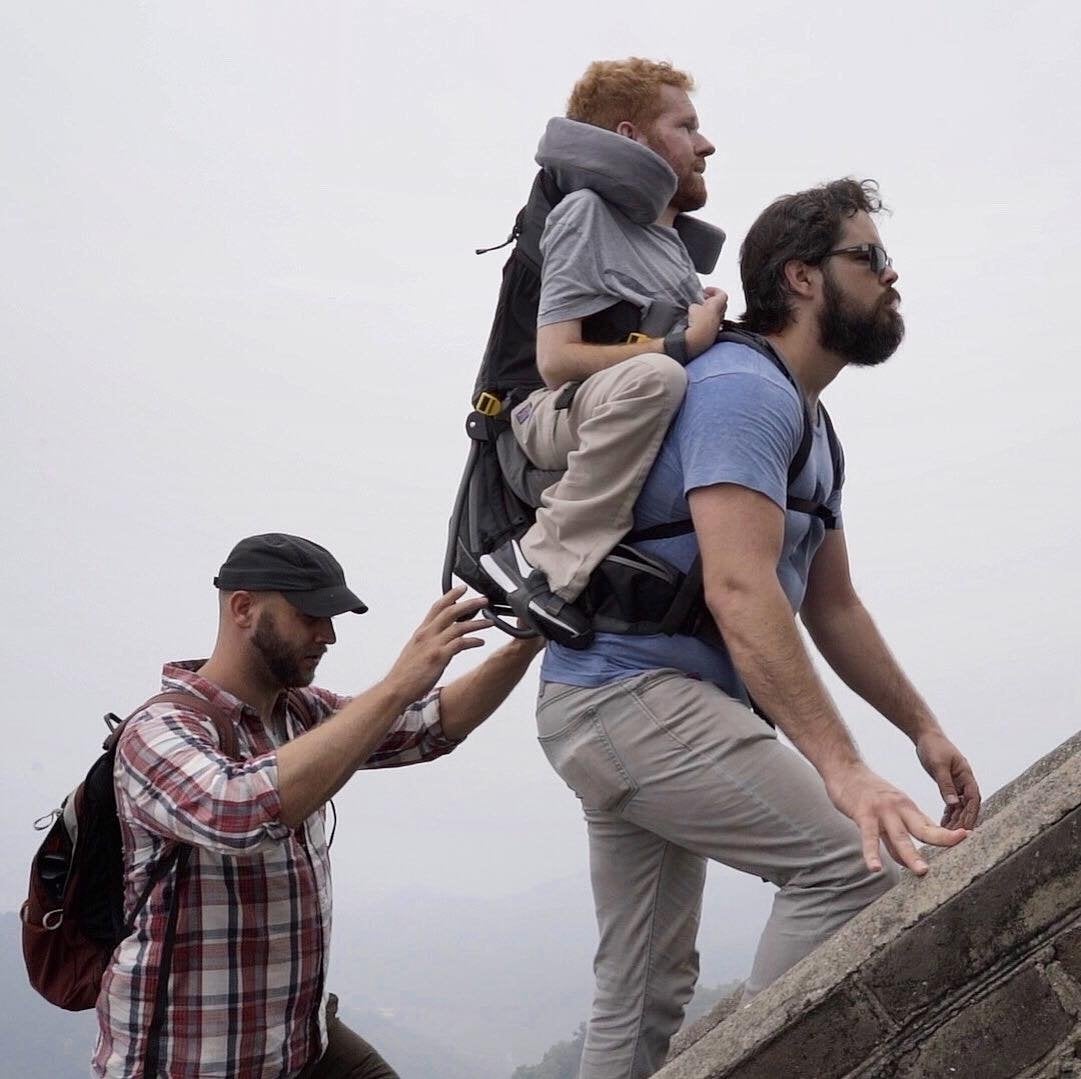Student group put ASU charter’s call for inclusivity into multiple learning experiences

Kevan and Katie Chandler (lower right inset), founders of wecarrykevan.org and creators of a "human backpack," visit with members of ASU's Tourism Student Association during a recent movie night. Photo courtesy Claire McWilliams
The Arizona State University Charter mandates that inclusion is front and center in all of ASU’s programs, classes, research and other activities.
Students in the Tourism Student Association, a student organization based at the School of Community Resources and Development (SCRD), devoted its major fall 2022 activities to focus on inclusive and accessible tourism, said longtime TSA faculty co-advisor Claire McWilliams.
McWilliams, an SCRD tourism development and management and hospitality lecturer, said the students decided before the semester began to have an entire slate of fall programs live out the mission of the charter.
McWilliams said she brought the idea to TSA leaders before the semester began, as she admired an author in the tourism industry who sought to travel beyond the constraints of his wheelchair and wanted to integrate his work into the club’s activities. From there, more ideas came up and a schedule of four events was created.
“In all my years advising the TSA, I’ve never been more inspired about what this student organization has achieved,” McWilliams said.
McWilliams said the fall programming included:
• A Sept. 28 appearance by Marisol Vindiola from Visit Tucson, who talked about cross-border tourism, which involved learning about and being aware of guests' needs, no matter what their point of origin.
• A Nov. 2 conversation with Ed Salvato, an author, editor and professor who is a thought leader in the LBGTQ tourism community. Salvato discussed how anyone can support inclusive tourism as it relates to the strong LGBTQ travel market. “Salvato reminded TSA’s future tourism leaders to go straight to the root of hospitality, to invite, respect and protect, to avoid making assumptions, and to use gender-expansive language that focuses on the reason for visiting, whether camper, cruiser or guest,” McWilliams said. “When in doubt, he said, ask.”
• A Nov. 9 “Fall Fireside” presentation by Alison Brooks from Visit Mesa, along with Camilo Bustos Navarro from Wheel the World and Brett Heising, a disability and diversity, equity, inclusion and belonging consultant. The three told students how universal design, training and partnerships can equip industry leaders and frontline service workers to help travelers overcome impediments to tourism activities related to neurodiversity and physical challenges. Visit Mesa’s leadership helped Mesa, Arizona’s third-largest city, to become the first-ever Autism Certified City in the United States.
• A Nov. 18 appearance by Kevan Chandler, author, advocate and founder of WeCarryKevan.org, who successfully left his wheelchair behind and journeyed as a “human backpack” by using an invention where he can be carried on the back of a hiker. TSA members raised more than $3,000 to purchase and outfit six of these adaptive backpacks, provide training for users and cover shipping costs. Members met Chandler via Zoom and watched a documentary he produced. McWilliams said members were impacted by his bravery, trust and total freedom-inducing joy in dancing, running and making it to a 360-view at the top of the Great Wall of China — all in the adaptive backpack with his friends carrying and supporting Chandler and enjoying the moments.
McWilliams said she was struck by a statement from Brooks, of Visit Mesa, that everyone will become disabled at some point in life, through injury, age, disease or some other cause, and so adaptive tourism methods will ultimately apply to anyone who seeks to travel.
McWilliams said all the presenters emphasized that providing equal opportunities to all tourists not only is the right thing to do, but can be profitable to someone in the tourism industry who opens up such opportunities to more people eager to spend on travel.
Students impressed with speakers' messages
Salvato’s message resonated with TSA member Cailia Flatt.
Kevan Chandler (top) sits in a "human backpack" as he joins friends traveling along the Great Wall of China. Photo courtesy Kevan Chandler
“My biggest takeaway was embracing the LGBTQ community. At the meeting, (Salvato) told us to yell the words ‘lesbian,’ ‘gay,’ ‘bisexual,’ ‘transgender’ and ‘queer/questioning’ out loud, because it was something to be proud of and not ashamed of,” Flatt said. “I've been an ally since my cousin came out in middle school. I was never ashamed to talk about it; I was just worried I would offend someone. After the experience, I didn't feel like I needed to censor my words anymore. The faster we make it normal, the faster it will be normal. That's what I thought after the whole thing."
TSA Secretary Jordyn Hoff said she found the experience of each event to be rare.
“They had us critically thinking about how inclusivity will fit into all the industries we want to go in. I could tell the students were so engaged through all these events, which is precisely what an officer wants to see in their club,” Hoff said. “It was great to see inclusivity on a local scale through our Fall Fireside, across borders with Marisol and globally with Kevan.”
TSA President Jeneca Kostad said she was “intrigued, inspired and amazed” at how well students learned to surmount obstacles to inclusivity within the tourism industry.
“I believe our club is the next generation to make the world more inclusive as a whole, starting with travel and tourism,” Kostad said. “TSA is out to make a change in the tourism industry!”


